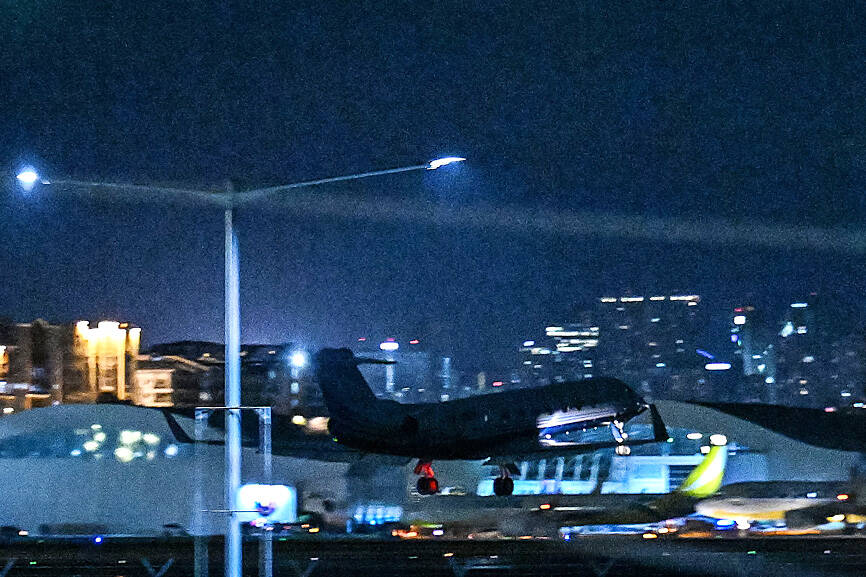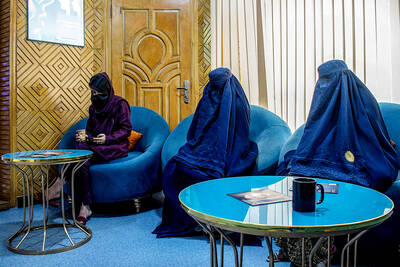Lawyers for former Philippine president Rodrigo Duterte, who is bound for The Hague, Netherlands, following his arrest on an International Criminal Court (ICC) warrant tied to his deadly crackdown on drugs, filed a petition yesterday demanding he be sent back to Manila.
The 79-year-old faces a charge of “the crime against humanity of murder,” according to the ICC, for a crackdown that rights groups estimate killed tens of thousands of mostly poor men, often without proof they were linked to drugs.
Yesterday morning, his lawyers said they had filed a Philippine Supreme Court petition on behalf of his youngest daughter, Veronica, accusing the government of “kidnapping,” and demanding it be compelled “to bring him back.”

Photo: AFP
“The ICC can only exercise its jurisdiction if a country’s national legal system is not functioning,” Duterte lawyer Salvador Paolo Panelo Jr told reporters outside the court, insisting the Philippine judicial system was “working properly.”
However, Philippine presidential press officer Claire Castro said cooperating with Interpol on the case was the government’s prerogative.
“This is not just surrendering a Filipino citizen, this is surrendering a Filipino citizen who is accused of crimes against humanity, specifically murder,” she said at a briefing.
At a church in the capital yesterday, some who lost family members in the crackdown gathered to discuss the former president’s arrest.
“Duterte is fortunate, there’s due process for him. There was no due process for my son. He will be lying down on a good bed, my son is already rotting at the cemetery,” Emily Soriano said of her son Angelito at a news briefing organized by a local rights group.
“For us — the poor, the victims — we weren’t able to receive that chance [at a trial],” said Llore Pasco, whose two sons were killed in 2017.
Philippine President Ferdinand Marcos Jr announced Duterte’s departure at a Tuesday news briefing shortly after 11pm.
“The plane is en route to The Hague in the Netherlands allowing the former president to face charges of crimes against humanity in relation to his bloody war on drugs,” Marcos said.
Duterte was arrested at Manila’s international airport on Tuesday after “Interpol Manila received the official copy of the warrant of the arrest from the ICC,” the presidential office said.
An ICC spokesman later confirmed the warrant and said an initial appearance hearing would be scheduled when Duterte was in court custody.
Before his departure, Philippine Vice President Sara Duterte said her father was being “forcibly taken to The Hague,” labeling the transfer “oppression and persecution.”
Her office issued a statement yesterday saying she had left on a morning flight for Amsterdam, without offering further details. The night before, the former president said he believed the Philippine Supreme Court would step in and prevent his transfer after his lawyers filed a petition.
“The Supreme Court will not agree to that. We do not have an extradition treaty,” Sara Duterte said on Instagram live shortly before his departure, but no reprieve materialized.
While supporters dubbed his arrest “unlawful,” reactions from those who opposed Rodrigo Duterte’s drug war were jubilant.
One group working to support mothers of those killed in the crackdown called the arrest a “very welcome development.”
“The mothers whose husbands and children were killed because of the drug war are very happy, because they have been waiting for this for a very long time,” Rise Up for Life and for Rights coordinator Rubilyn Litao said.

DEADLOCK: Putin has vowed to continue fighting unless Ukraine cedes more land, while talks have been paused with no immediate results expected, the Kremlin said Russia on Friday said that peace talks with Kyiv were on “pause” as Ukrainian President Volodymyr Zelenskiy warned that Russian President Vladimir Putin still wanted to capture the whole of Ukraine. Meanwhile, US President Donald Trump said that he was running out of patience with Putin, and the NATO alliance said it would bolster its eastern front after Russian drones were shot down in Polish airspace this week. The latest blow to faltering diplomacy came as Russia’s army staged major military drills with its key ally Belarus. Despite Trump forcing the warring sides to hold direct talks and hosting Putin in Alaska, there

North Korea has executed people for watching or distributing foreign television shows, including popular South Korean dramas, as part of an intensifying crackdown on personal freedoms, a UN human rights report said on Friday. Surveillance has grown more pervasive since 2014 with the help of new technologies, while punishments have become harsher — including the introduction of the death penalty for offences such as sharing foreign TV dramas, the report said. The curbs make North Korea the most restrictive country in the world, said the 14-page UN report, which was based on interviews with more than 300 witnesses and victims who had

COMFORT WOMEN CLASH: Japan has strongly rejected South Korean court rulings ordering the government to provide reparations to Korean victims of sexual slavery The Japanese government yesterday defended its stance on wartime sexual slavery and described South Korean court rulings ordering Japanese compensation as violations of international law, after UN investigators criticized Tokyo for failing to ensure truth-finding and reparations for the victims. In its own response to UN human rights rapporteurs, South Korea called on Japan to “squarely face up to our painful history” and cited how Tokyo’s refusal to comply with court orders have denied the victims payment. The statements underscored how the two Asian US allies still hold key differences on the issue, even as they pause their on-and-off disputes over historical

Decked out with fake crystal chandeliers and velvet sofas, cosmetic surgery clinics in Afghanistan’s capital are a world away from the austerity of Taliban rule, where Botox, lip filler and hair transplants reign. Despite the Taliban authorities’ strict theocratic rule, and prevailing conservatism and poverty in Afghanistan, the 20 or so clinics in Kabul have flourished since the end of decades of war in the country. Foreign doctors, especially from Turkey, travel to Kabul to train Afghans, who equally undertake internships in Istanbul, while equipment is imported from Asia or Europe. In the waiting rooms, the clientele is often well-off and includes men